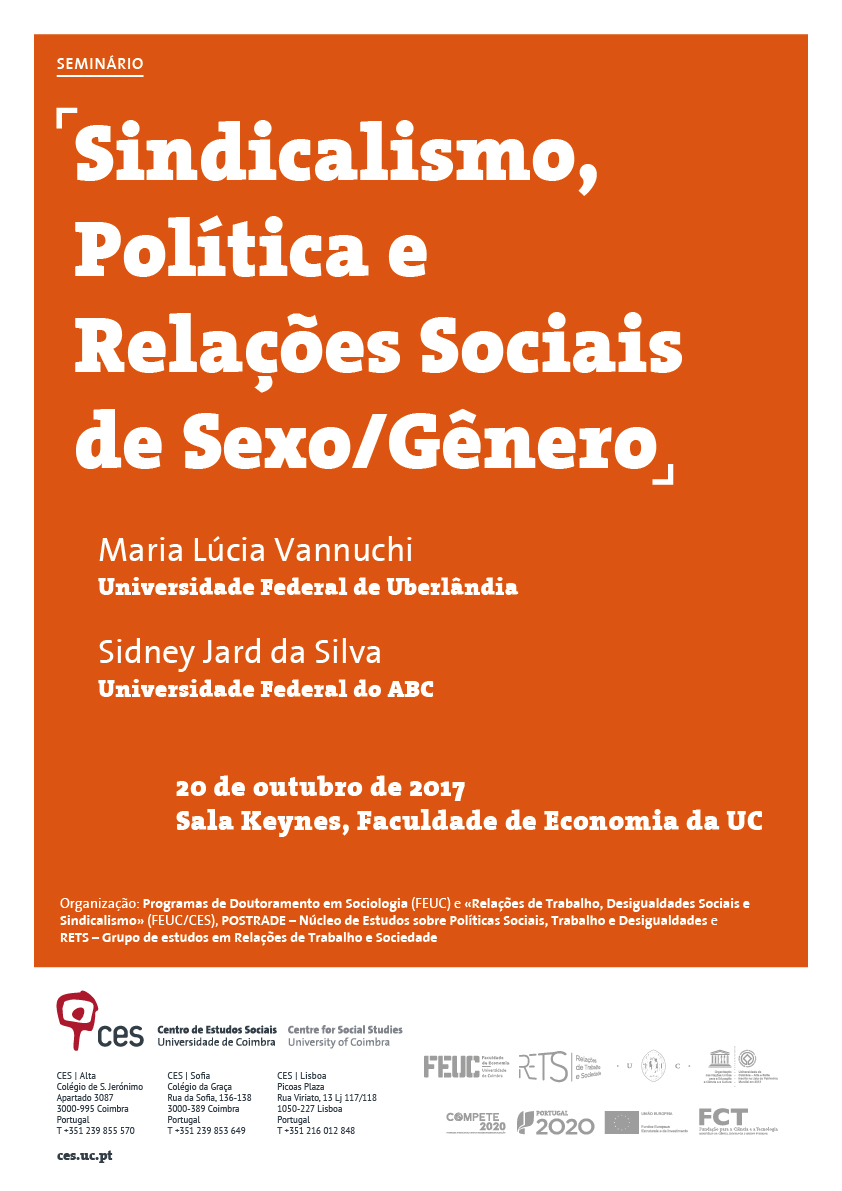Seminar
Trade Unionism, Politics and Social Relations of Sex/Gender
Maria Lúcia Vannuchi
Sidney Jard da Silva
October 20, 2017, 17h00
Keynes Room, Faculty of Economics, University of Coimbra
Abstract
This seminar will present the research problems developed by two postdoctoral researchers at the Centre for Social Studies - University of Coimbra (CES-UC). From the theoretical and methodological contributions of Sociology of Labour, Political Science and Studies of Social Relations of Sex/Gender, the presentation highlights the importance of interdisciplinary dialogue in studies of the world of labour and trade unionism.
In the sociological perspective, research assumes as a presupposition the centrality of the social class relations in the labour space, the sexuated nature of labour that requires the consideration of the heterogeneity and the particularities of the workers, as well as the need to attend to the social, international and sexual division of labour that shapes the productive processes, forms of labour management, and social relations in the current dynamic of flexible accumulation of capital.
From the perspective of Political Science, the focus centres on the importance of the political-institutional constraints that limit the participation of trade unions in the decision-making process of public policies. In the case of pension reforms, one of the main challenges of world trade unionism in recent decades, the particular characteristics of political systems define the degree of inclusion of workers and their representative entities in negotiated social security reform processes. The Brazilian coalition presidentialism is a notorious case of the relevance of the “rules of the game” for the understanding of trade union behavior in the processes of retraction of social security systems.
Programme
I) Labour and gender in the shoe industry: a comparative study between Portuguese and Brazilian production centres - Maria Lúcia Vannuchi (Federal University of Uberlândia)
This study, in the line of labour and gender research, analyses in international comparison the intersection of class and sex/gender social relations in productive sectors of Brazil and Portugal, by the comparison of shoe manufacturing units, portrayed in case study. Its presuppositions are the centrality of the relations of social classes in the labour space, the sexed nature of the work that requires the consideration of the heterogeneity and the peculiarities of the workers, as well as the need to pay attention to the social, international and sexual division of labour that shapes the productive processes, forms of labour management, and social relations in the current dynamics of flexible accumulation of capital.
II) Trade unionism, Politics and Pension Reform in Brazil - Sidney Jard da Silva (Federal University of ABC)
This research analyses the participation of trade union parliamentarians (deputies and senators) in the decision-making process of the social security reforms implemented in Brazil in the last twenty years. The results confirm the thesis of the predominance of the party orientation on the legislative behaviour of the labour union. However, the findings also demonstrate that it is not a question of mere political subordination, but rather of a complex negotiation process involving institutional, partisan and union actors.
Organisers: Doctoral Programme in Sociology/FEUC, Doctoral Programme "Labour Relations, Social Inequalities and Trade Unionism", POSTRADE/CES, RETS - Study Group on Labour Relations and Society


